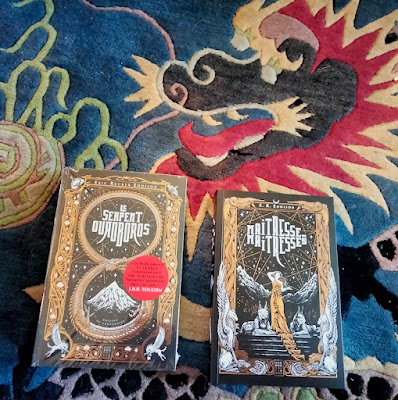.
Look what came in the mail recently! The first French Edition of E. R. Eddison's magisterial fantasy, Mistress of Mistresses published and beautifully packaged by Éditions Callidor. Translated by Patrick Marcel, with illustrations by Emily C. Martin.
I received a copy because back in January, Thierry Fraysse of Éditions Callidor asked Ellen Kushner, who had done an introduction to Eddison's The Worm Ouroboros for them that had made everybody extremely happy, if she could do something similar for Maitresse des Maitresses. "Sure," she said. "When do you want it?"
By the end of the month, as it turned out.
You may not be aware of this, but a well-researched and carefully thought-through introduction takes a lot of time and work. So, knowing I was a fellow Deep Lore Nerd when it came to the Zimiamvian Trilogy, Ellen suggested we collaborate. And, boy howdy, did we! I came up with the conversational format and we swapped emails back and forth, several times a day, right up to the deadline. It was great fun. And I think we came up with something special.
Here's a small taste, from early in the colloquy:
MICHAEL
They [the books] were never quite forgotten.
Given that before the Tolkien explosion high fantasy was scarcer than hippogriffs, it can be assumed that anybody who took fantasy seriously then (their number was admittedly small) had to find and read him.
An informal survey of the fantasy writers of the forties through mid-sixties reveals that L. Sprague de Camp, Fletcher Pratt, Fritz Leiber, Ursula K. Le Guin, Michael Moorcock, Poul Anderson, James Blish, and of course J. R. R. Tolkien and C. S. Lewis were all documented readers and admirers of Eddison. There were doubtless many more. James Stephens wrote an introduction to The Worm Ouroboros, comparing Eddison to Shelley, Blake, and Milton. De Camp, who dedicated a chapter of Literary Swordsmen and Sorcerers to Eddison, called Mistress of Mistresses "a splendid story, quite different from The Worm Ouroboros but almost on a level with it." Eddison's contemporary James Branch Cabell, wrote: "I find here—in his finest, his purest, and his most romantic vein—the finest living writer of pure romance." Other than Cabell, however, every single one of them thought The Worm Ouroboros was superior to the Zimiamvian Trilogy.
They were wrong.
ELLEN
They were so very wrong. Maybe it’s because they just weren’t used to what Eddison was offering in Zimiamvia. The Worm Ouroboros has the feel of a Norse saga, and Norse sagas were familiar to Anglo lovers of fantasy.
Mistress of Mistresses presents us with a Renaissance court, with scheming courtiers with elaborate politics, even more elaborate costumes, and vastly elaborate philosophical discussions on the nature of reality that could make a scholar’s eyes cross—with an added dash of Provencal romance. And unlike popular heroic fantasy then and now, good and evil are not so clearly delineated. Good guys can behave badly, and bad guys can be gracious. Indeed, Zimiamvia’s villains can be so utterly delicious that the book’s hero, Lord Lessingham, throws in his lot with one of them.
If you're curious what else we had to say, you'll have to buy a copy of Maitresse des Maitresses and read it in French. Presumably, someday it will appear in English--I'll leave the details of that to Ellen. But if and when it does, trust me, I'll share the information here.
In the meantime, since Éditions Callidor very graciously also sent me a copy of Le Serpent Ouroboros with Ellen's introduction, here's a photo of the two books together. (The red sticker is a gushing blurb by J. R. R. Tolkien.)
*


I'll have to wait, I guess. I tried mightily, strenuously to get into The Worm O but gave up after a hundred pages or so. Perhaps I wasn't high enough.
ReplyDelete